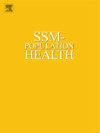Divergence in the size and composition of the race gap in mental health: Evidence from South Africa
IF 3.1
2区 医学
Q1 PUBLIC, ENVIRONMENTAL & OCCUPATIONAL HEALTH
引用次数: 0
Abstract
Quantitative studies of mental health in South Africa typically find that Black African adults report significantly more depressive symptoms than other adults on average. However, insufficient attention has been paid to differences among Black African adults, and to how the distribution of depressive symptoms compares between these adults and other adults. We augment existing research by investigating how the size and composition of the race gap in depression scores varies at different percentiles of the mental health distribution. We analyze national self-reported data on the frequency of depressive symptoms, and estimate recentred influence function decompositions of the unconditional race gap at each quantile of the distribution. The analysis identifies a race gap in depression scores that is twice as large at the lower tail of the mental health distribution than at the upper tail, signalling that Black African adults are particularly less likely than other adults to report no, or only a few, symptoms. At the lower tail, the race gap derives mostly from differences in the relationship between characteristics and mental health, while at higher percentiles, differences in the level of endowments, or stressors, are more important. At the upper tail, where depression scores are likely to correspond to major depressive episodes, the race gap narrows to zero. The size and composition of the average race gap in depression scores therefore masks considerable variation about the mean, which should be considered when policy is targeted to redress inequalities in mental health treatment.
心理健康方面种族差距的大小和构成的差异:来自南非的证据
南非心理健康的定量研究通常发现,非洲黑人成年人报告的抑郁症状明显多于其他成年人。然而,对非洲黑人成年人之间的差异以及这些成年人与其他成年人之间抑郁症状分布的比较关注不够。我们通过调查在心理健康分布的不同百分位数上,抑郁得分的种族差距的大小和组成是如何变化的,来扩大现有的研究。我们分析了关于抑郁症状频率的国家自我报告数据,并估计了分布中每个分位数的无条件种族差距的近中心影响函数分解。分析发现,在心理健康分布的下尾,抑郁得分的种族差距是上尾的两倍,这表明非洲黑人成年人比其他成年人更不可能报告没有或只有几种症状。在较低的尾部,种族差距主要来自性格和心理健康之间关系的差异,而在较高的百分位数上,禀赋水平或压力源的差异更为重要。在上尾,抑郁得分可能与重度抑郁发作相对应,种族差距缩小到零。因此,抑郁症得分的平均种族差距的大小和构成掩盖了均值的相当大的差异,当政策的目标是纠正心理健康治疗中的不平等时,应该考虑到这一点。
本文章由计算机程序翻译,如有差异,请以英文原文为准。
求助全文
约1分钟内获得全文
求助全文
来源期刊

Ssm-Population Health
PUBLIC, ENVIRONMENTAL & OCCUPATIONAL HEALTH-
CiteScore
6.50
自引率
2.10%
发文量
298
审稿时长
101 days
期刊介绍:
SSM - Population Health. The new online only, open access, peer reviewed journal in all areas relating Social Science research to population health. SSM - Population Health shares the same Editors-in Chief and general approach to manuscripts as its sister journal, Social Science & Medicine. The journal takes a broad approach to the field especially welcoming interdisciplinary papers from across the Social Sciences and allied areas. SSM - Population Health offers an alternative outlet for work which might not be considered, or is classed as ''out of scope'' elsewhere, and prioritizes fast peer review and publication to the benefit of authors and readers. The journal welcomes all types of paper from traditional primary research articles, replication studies, short communications, methodological studies, instrument validation, opinion pieces, literature reviews, etc. SSM - Population Health also offers the opportunity to publish special issues or sections to reflect current interest and research in topical or developing areas. The journal fully supports authors wanting to present their research in an innovative fashion though the use of multimedia formats.
 求助内容:
求助内容: 应助结果提醒方式:
应助结果提醒方式:


